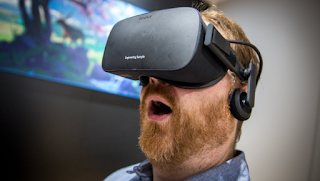10 Tech trends in 2017
Virtual-Reality
Virtual reality has experienced significant
growth, improvement and visibility in 2016. It has not changed society. VR will
remain one of the most important development techniques in the coming year, but
2017 will mark the beginning of the transition from a curiosity to a practical tool
to improve otherwise banal activities.
Expect, for example, introductions less
hardware, but more integration with existing platforms. 2017 will be the people
of the year receive Social Research Council. Facebook made some great promises
and offered catchy demonstrations in 2016 during its annual F8 Developers
Conference (VR selfie stick, anyone?). If you (and your Facebook friends) take
even the most basic VR material, this should have been a great upgrade for you
in the New Year.
Also, keep your eyes open for an explosion of
consumer content (more games, movies, TV shows and concerts) and, better yet,
VR art.
Augmented Reality
As VR unfolds its
wings, augmented reality will be 2017 true star. Mixed reality platform of
Microsoft Windows Holographic, which recently had a major hardware infusion
will mean new mixed reality experiences for Windows users. This should also be
the year Apple finally soak their feet in the AR (no, not VR).
Augmented reality will
gain more WR next year because it will arrive via mobile devices and without
the need for additional hardware. Early experiences through existing handsets
will drive the purchase of new AR headphones, with, in particular, as consumers
and businesses see a slightly more immersive hand-version and augmented
reality.
In case you are
wondering what to do with the AR, will continue to increase games, toys (Star
Wars toy line has made great things for AR in years), work and retail. This may
even be the year we see a cargo version of the Magic Leap, provided that it was
not a big load of hype.
Screen Technology
2017, you can enjoy a lot like AR and VR on a
new 4K smartphone screen. Because the trajectory of Flatlined HDTV technology
in recent years (does not really care about screens on curves or 3D, and more
"big" does not count as innovation) display factory has focused its
attention on converting screens that are with We almost 24/7.
OLED displays should help 2017 smartphones get
thinner and more efficient than ever battery. UHD screens came on smartphones
back in 2015 (thanks, Sony! Sort of), but did not increase much further. This
will change in 2017. The big question is, can we say, even the difference
between Full HD (1080p) and UHD on a screen this small?
Why is it important in 2017? See the first
technology I mentioned. Consumers will slip more of their smartphones into VR
headphones next year. When the screen is so close and enlarged, the higher the
resolution, the better.
There was also a lot of discussion about the
screens. We know a rollable screen is possible, but do not expect any form of
display of flexible 2017 smartphones until manufacturers like LG, Samsung and
Apple can understand how to make practical models for consumers. Thinner will
gain more flexibility for the foreseeable future.
Human augmentation technologies
Every year, I say a little prayer: this is the
year I finally got my C-3PO and every year I'm disappointed. There are humanoid
robots and animals in our world, including pepper, Asimo, Boston Robotics
menagerie, but none of them are on their way into our homes anytime soon.
In 2017 but could be the year in small groups
to improve human robotics - exoskeleton and some of the most revolutionary
prosthesis we have ever seen. The exoskeleton will focus on helping people to
return, standing for long periods of time and lifting heavy loads. Iron Man,
here we are.
Batteries
2016 has shown that if you are not very
careful in how you manufacture batteries and the technology around them, it can
go very wrong. In 2017 there will be renewed focus on increasing the safety and
life of lithium-ion technology. We can also see a lithium metal battery
technology testing.
Security, Privacy and Bio-metrics
There
have been 12 months of bad news on the piracy front. People (and businesses)
simply can not trust to protect their privacy with uncrackable security and
correct password.
For
years, the fingerprint technology reserved for business-class systems.
Fingerprint readers on our smartphones has been a first step in a wide-consumer
biometric security. The introduction of facial recognition on computers
(Windows Hello) and Touch ID on the MacBook Pro is a sign that the password
loosen its grip of death on our personal integrity.
2017
may be the year of escape biometric security. We should use our fingers, faces,
eyes, heartbeat and also activity patterns to unlock technologies and protect
our economy and personal life. By 2018, not all use a body part to lock the
technology is considered a reckless eccentric.
Encryption
will continue to spread through mobile and communication technologies, even
when entering businesses push thrust to penetrate devices that enforce law
enforcement. There will be a very public battle on backdoor technology in 2017?
Probably.
Self-driving car
Self-driving is increasingly a part of
everyday life. In 2017 we will see more independent style solutions,
people-mover (think mini-bus and bus) and a cascade of deregulation in the
country. At the end of the year, most of the states to be sympathetic
autonomous vehicle.
2017 could be the year we finally see Elon
Musk is almost supersonic travel dream becomes real, or at least tested in the
real world when Hyper trail Man running his first full test of transport
because of the behavior (assuming that society does not implode before)
Data And Facts
The currency of information technology and its
collection and application is no less important in the coming year. With so
many questions about false news and facts, data can be the key to identifying
truth in an area of uncertainty. Expect some intelligent companies with interesting
ideas on how to use the mountains of data, programming and learning the machine
to separate the facts of fiction is finally a clinical and indisputable way.
Personal Streaming
Smart Clothes
Smartwatches will continue its slow expansion
next year, but 2017 should finally be the year of truly portable technology.
Clothing in fur, shoes, socks, underwear, bras and more will receive a deep
infusions of technology, especially if the project of Google jacquard and other
intelligent textile innovations can migrate from laboratory to retail racks .
You must get used to lighting and plugging your clothes.
Source: Mashable


















0 Comments